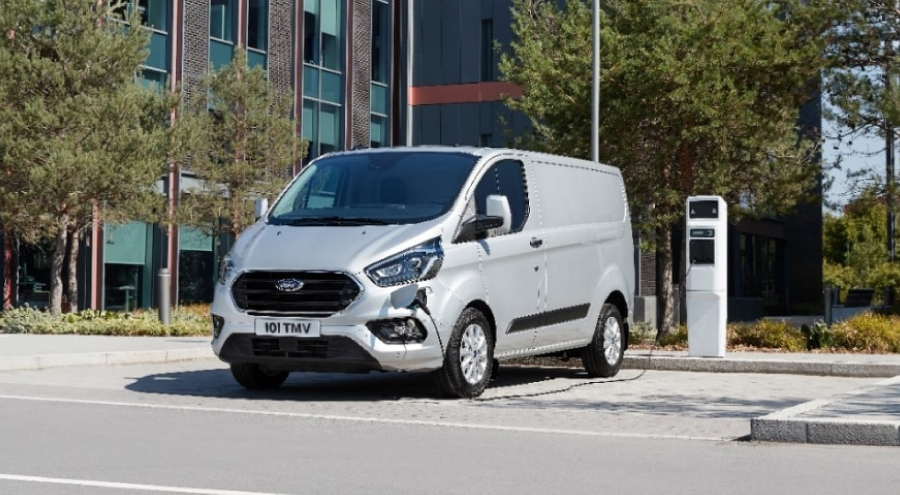Should I Buy an Electric Van? The Pros & Cons

On the fence about buying an electric van? We’ve rounded up the top pros and cons to help you decide.
Choosing the van that’s right for you is a key decision, whether you’re managing a fleet of vehicles or running a business. If you want to improve your eco-credentials, then it’s especially important to consider your impact on the environment.
Ultra-Low Emission Zones (ULEZ) have been in place across Central London since 2019, along with the congestion charge. It means vans must meet strict emission standards or drivers will have to pay a daily fee for driving in that area. Other parts of the country are following suit with their own schemes.
Additionally, the government plans to ban the sales of new petrol and diesel-powered vans (and cars) by 2035, in a bid to make the UK carbon-neutral by 2050. However, some hybrids will be allowed on the roads until 2035.
All of this means that you could well be considering an electric model for your next van purchase. Here, we consider some of the pros and cons of electric vans, to help you make an informed decision.
Pros
Cheaper to run
One of the biggest pros of electric vans is their lower running costs. The Citroen e-Berlingo, for instance, costs under £2 to run for 40 miles (or 2-3p per mile), according to the manufacturer.
With fewer moving parts and less pressure on the brakes, you’ll find all your maintenance bills drop too.
Gentle on the planet
With no tailpipe emissions, electric vans are incredibly eco-friendly. So, you’ll be doing your bit to enhance air quality – especially if your fleet operates in a built-up area.
Enhanced business image
Imagine being able to announce that your vans run on electricity on all your communications, livery, and branding. To eco-conscious customers, this makes all the difference when it comes to proving you’re the right choice for them.
Driver-friendly
Most electric models are automatic. With no clutch or gear changes and immediate torque, they’re much smoother to drive. You’ll also find them incredibly quiet thanks to the absence of an engine.
Buying incentives
Among a number of incentives to ‘electrify’ your fleet is the government’s Plug-in Van Grant, which offers a discount of up to 20% off the listed price, up to £5,000. There are also tax benefits, and grants to help fund business-based charging points.
Some places even offer free parking or charging, plus you won’t have to pay the ULEZ charge in London.
It’s no surprise that businesses are increasingly ‘going electric’ with their vans, given all the benefits. You can read more on this in our article on the benefits of an electric van.
However, as with anything else, you’ll need to understand the potential downsides, too.
Cons
Higher initial cost
While electric models are cheaper to run, the upfront expense is often greater. Clearly, this could change in future as these vehicles become more popular. Thankfully, flexible finance options like our Van Leasing deals can help you cut the cost and pay in a way that suits your budget.
Lower payload
Due to their larger, heavier batteries, electric vans often have a lower payload compared to diesel or petrol vans. If payload is a priority for your business, then this is something you’ll need to consider.
On the plus side, if this is something you can work with, you’ll be able to enjoy a longer electric driving range.
Depreciation uncertainties
While all vehicles depreciate, some people believe that electric models do so more rapidly. However, experts believe this could change in the future as the gap between the depreciation of conventional vans narrows.
Range anxiety
When the EV market first started growing, a major concern for motorists was range anxiety. Would they have enough range to get where they need to go? In the beginning, the driving range offered by EVs was lower than petrol or diesel vehicles. Luckily, many new models offer an improved electric driving range with faster charging capability to combat this.
Charging concerns
While there are thousands of charging points UK-wide, coverage can be patchy, especially in rural areas. There are also more rapid chargers needed to make faster charging more widely accessible.
Again, though, this is changing as the public charging network continues to expand rapidly. Zap-Map currently reports that there are over 53,000 charging stations across the UK – and counting!
Shop electric vans at Vansdirect
Electric vans may not be 100% right for every fleet, but they could make a significant difference to your business. At Vansdirect, we have a wide range of new electric vans on lease for you to explore. Shop models from top manufacturers like Citroen, Ford, Peugeot, Renault, Vauxhall, and many more.
Not sure what you’re looking for? Get in touch with our expert team will be able to help. With over 20 years in the industry and various awards wins, we know a thing or two about what makes a great van. Check out our competitive deals and excellent value vans – electric or conventionally powered.
Shop latest electric van deals
Find this electric van article interesting?
Check out our Electric Van Hub where you'll find even more useful information such as the benefits of electric vans and electric van reviews.
















